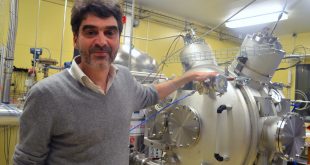The European H2020 Subcultron project was completed in November 2019 and successfully deployed an autonomous fleet of underwater robots in the Venice lagoon. After four years of work, the research consortium — which includes IMT Atlantique — has demonstrated the feasibility of synchronizing a swarm of over one hundred autonomous units in a complex environment. An achievement made possible by …
Read More »Search Results for: big data
CoronaCheck : separating fact from fiction in the Covid-19 epidemic
Rumors about the origins of the Covid-19 epidemic and news about miracle cures are rampant. And some leaders have taken the liberty of putting forth questionable figures. To combat such misinformation, Paolo Papotti and his team at EURECOM have developed an algorithmic tool for the general public, which can determine the accuracy of the figures. In addition to its potential for …
Read More »Joint AI: a platform to facilitate German-French research in AI
In 2019, The German-French Academy for the Industry of the Future launched the Joint AI platform project. This platform bringing together IMT and the Technical University of Munich, promotes collaboration between researchers and industry to develop artificial intelligence tools. Its secure environment allows for intellectual property protection for the results, and the reproducibility of scientific results. “The primary aim …
Read More »Unéole on our roofs
We know how to use wind to produce electricity, but large three-bladed turbines do not have their place in urban environments. The start-up Unéole has therefore developed a wind turbine that is suitable for cities, as well as other environments. It also offers a customized assessment of the most efficient energy mix. Clovis Marchetti, a research engineer at Unéole, explains …
Read More »Is dark matter the key to the medical scanner of the future?
A team of researchers at IMT Atlantique is developing a new type of medical scanner called XEMIS. To create the device, the team drew on their previous research in fundamental physics and the detection of dark matter, using liquid xenon technology. The first time the device was tested was using small animals. It allowed the scientists to significantly lower the …
Read More »The ethical challenges of digital identity
Article written in partnership with The Conversation. By Armen Khatchatourov and Pierre-Antoine Chardel, Institut Mines-Télécom Business School The GDPR recently came into effect, confirming Europe’s role as an example in personal data protection. However, we must not let it dissuade us from examining issues of identity, which have been redefined in this digital era. This means thinking critically about major ethical and philosophical issues that …
Read More »Light, a possible solution for a sustainable AI
Maurizio Filippone, Professor at EURECOM, Institut Mines-Télécom (IMT) We are currently witnessing a rapidly growing adoption of artificial intelligence (AI) in our everyday lives, which has the potential to translate into a variety of societal changes, including improvements to economy, better living conditions, easier access to education, well-being, and entertainment. Such a much anticipated future, however, is tainted with issues …
Read More »Smart homes: A world of conflict and collaboration
The progress made in decentralized artificial intelligence means that we can now imagine what our future homes will be like. The services offered by a smart home to its users are likely to be modeled on appliances which communicate and cooperate with each other autonomously. Today, this approach is considered the best way to control the dynamic, data-rich household environment. …
Read More »What is cyber sovereignty?
Sovereignty is a concept that is historically linked to the idea of a physical territory, whereas the digital world is profoundly dematerialized and virtual. So what does the notion of cyber sovereignty mean? It combines the economic strength of online platforms, digital technologies and regulations based on new societal values. Francis Jutand, Deputy CEO of IMT and member of the …
Read More »Improving organization in hospitals through digital simulation
How can we improve emergency room wait times, the way scheduled hospitalizations are managed and cope with unexpected surges of patients? Vincent Augusto, a researcher in healthcare systems engineering at Mines Saint-Étienne is working to find solutions to these problems. He is developing programs based on digital simulation, aimed at optimizing influxes of patients and waiting times at the hospital, …
Read More » I'MTech L'actualité scientifique et technologique de l'IMT
I'MTech L'actualité scientifique et technologique de l'IMT









